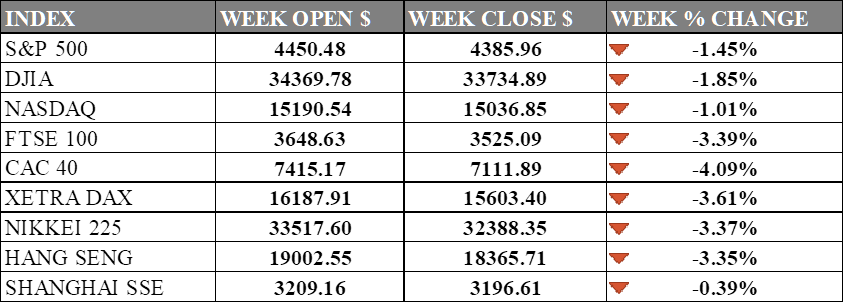PAST WEEK'S NEWS (JULY 03 – JULY 07, 2023)
Mortgage rates in the US have reached their highest level this year, standing at 7.1%, more than double the rates from two years ago. This has led to a nearly $1,000 per month increase in average monthly mortgage payments on a $400,000 home. The surge in rates has caused a 20% drop in new home listings, while homeowners are hesitant to sell as they are locked into low-rate deals, resulting in a decrease in available properties. The high rates, combined with low housing inventory, are pricing out many potential homebuyers from the market, and it's expected to continue worsening as the majority of Fed officials expect another two rate hike this year.
Meta's CEO, Mark Zuckerberg, launched Threads, a Twitter-like companion app for Instagram, escalating his rivalry with Elon Musk a week after being challenged by the SpaceX CEO to a cage fight. Within two hours, the app garnered 2 million sign-ups while Meta's share is up almost 3%. Threads allow users to make short text posts, like, repost, and reply. The launch presents an opportunity for Meta to compete with Twitter and divert ad revenue as more social media content focuses on short videos and text-based interactions. Success hinges on attracting Instagram users rather than converting Twitter power users, but it is not impossible as Twitter is temporarily limiting daily tweet views that are taken negatively by users.
INDICES PERFORMANCE

All the indices recorded negative returns for the week, indicating a bearish sentiment in the global equity markets. The reasons for the sell-off rely solely on the expectations that the Federal Reserve will resume its rate hike for another two meetings although labour market proved to be softening.
The CAC 40 index of France had the worst performance among the eight indices, dropping by 4.09% from 7415.17 to 7111.89. The French stock market was hit by disappointing economic data, political turmoil ahead of the presidential election in 2024, and weak earnings. The XETRA DAX index of Germany and the FTSE 100 index of the UK also suffered significant losses, falling by 3.61% and 3.39% respectively. The German and British stock markets were affected by the inflation pressures in the eurozone and the UK, which lead to tighter monetary policy and higher interest rates for longer. Meanwhile, Construction PMIs for Europe indicated another month of contraction in the construction sector.
The NIKKEI 225 index of Japan and the HANG SENG index of Hong Kong declined by 3.37% and 3.35% respectively, reflecting the ripple of weakness from the U.S. economic data. The DJIA index of the US and the S&P 500 index of the US also posted negative returns, dropping by 1.85% and 1.45% respectively. The US stock market was dragged down by the inflation worries, expectation of another rate hike, and the strong labour data. The NASDAQ index of the US had one of the least declines in value, although it still fell by 1.01%. The US technology sector was relatively resilient to the market downturn, as it benefited from the risk-averse funds holding on to their position.
CRUDE OIL PERFORMANCE

Crude oil rallied last week due to weaker U.S. jobs data, causing a decline in the dollar. The Federal Reserve's intention to raise rates twice more this year remains unchanged. Investors are now awaiting the upcoming inflation reading to gauge market sentiment. While job additions in June fell below expectations, signalling progress in combating inflation, economists predict a potential decrease in the Consumer Price Index for June. The crude oil rally suggests improved market sentiment regarding rate hikes. Some Analysts suggested that the strong rally in price triggered some institution to exit their short positions, further boosting the oil price outlook in the week to come.
OTHER IMPORTANT MACRO DATA AND EVENTS
Government bond markets worldwide are on a sharp decline in expectation of higher interest rates, resulting in losses for bond investors as demand falls. The rise in longer-dated bond yields, coupled with hawkish signals from central banks and strong economic data, suggests that rates may remain elevated for an extended period, prompting concerns about negative returns and pressure on equity markets.
Japan's nominal base salary grew at the fastest pace in 28 years in May, increasing the debate on when the Bank of Japan will unwind its ultra-loose monetary policy. Regular wages rose 1.8% in May, the largest gain since February 1995, boosting worker's total cash earnings by 2.5%. However, real wages contracted 1.2% in May, the 14th consecutive month of decline, and household spending fell 4.0%, indicating the persistent impact of consumer inflation on purchasing power.
The Bank of Canada is expected to raise interest rates to 5.00% on July 12 and maintain this level until at least 2024, despite a slowdown in inflation. Economists anticipate a positive economic outlook with steady GDP growth and a tight job market, but the possibility of a recession in the next two years remains uncertain. The Canadian dollar is expected to strengthen due to the prolonged high interest rates.
What Can We Expect from The Market This Week
Consumer Price Index: Inflation data is going to be the market's biggest focus coming from the U.S. and Germany ahead of Interest rate decisions for both economies this month. The shock of FOMC minute meeting reinforcing another two rate hike after a “resting period” to assess the effect of yearlong continuous interest rate hike before deciding further moves although softening payroll data may cause uncertainty.
Interest rate decision: The Bank of Canada and Reserve Bank of New Zealand are about to have a policy meeting where the former is expected to raise 25 bps while the latter is expected to pause. With New Zealand slipping into a recession, the central bank is likely to step back and monitor inflation pressures.
US PPI: The Producer Price Index is a leading indicator of inflation from the U.S. that could influence the outlook for the Federal Reserve's next meetings because it reflects the cost pressures faced by producers, which can affect their profit margins and pricing decisions.
EIA short-term energy outlook: It provides insights into the current and expected trends and developments in the energy sector, as a reversal in trends is expected as oil gained last week. With the prevailing macro uncertainty, market attention will be primarily directed towards any revisions to the demand forecasts in these reports.
UK GDP: Coupled with industrial and manufacturing production, the UK GDP report will serve as a ruler for the economic condition in the region, with a quite severe slowdown expected for the month. Experts’ express doubts about the timely and budgeted delivery of several major military projects as defence equipment programme costs have increased by £9 billion in one year, prompting calls for better management.













